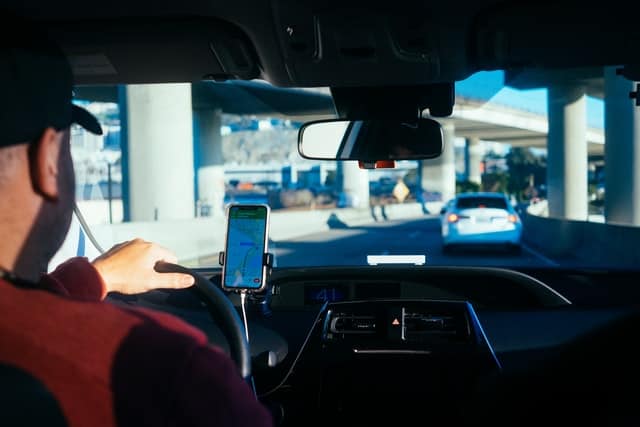Rideshare Insurance: Everything You Need to Know
If you are working for a rideshare company like Uber or Lyft, rideshare insurance can provide enough coverage in case you get into a car accident.
Rideshare companies offer some type of coverage — however, purchasing rideshare car insurance is a good idea if you want to avoid paying for car repair and medical bills.
Rideshare insurance is also a good idea if you want to bridge the gap between your personal car insurance and the coverage offered by rideshare companies. Here’s what you need to know.

What is Rideshare Insurance?
First of all, rideshare is any transportation service that clients use via an online app. After requesting a ride from nearby registered drivers, the drivers pick them up and drive them to desired locations for a fee. There are no cash exchanges because payments are processed electronically.
Rideshare companies like Uber and Lyft offer insurance protection once a driver logs into the app. However, the coverage is limited until a ride request is accepted. On the other hand, a driver’s personal policy has certain coverage exclusions during this period as well. Rideshare auto insurance fills these gaps and covers the drivers as much as they need.
Stages of Rideshare Driving
There are three stages while a rideshare app is on:
- Available – The driver is free to pick up a passenger.
- En route – The driver has accepted the ride and is on the way to pick up the passenger.
- On the trip – The driver has picked up the passenger and is driving them to their destination.
Knowing these stages is important because when an Uber or Lyft rideshare app is off, a driver’s personal auto insurance applies. Once the rideshare app is on, rideshare companies provide some coverage. Knowing the gaps between coverage is crucial for making sure your vehicle is protected.
What Does Rideshare Insurance Cover?
Third-Party Liability Coverage
This type of policy covers bodily injuries and property damages caused to a third party. A third party is defined as someone or something other than the driver or their vehicle.
Uninsured/ Underinsured Motorist Bodily Injury Coverage
This policy covers injuries suffered by a rideshare driver and their riders in case an accident happens during the rideshare trip and the other driver who is at fault doesn’t have sufficient insurance. This policy is also useful in case of a hit-and-run accident.
Contingent Collision and Comprehensive Coverage
If you have a comprehensive and collision policy on your personal car insurance policy, the rideshare company provides collision and comprehensive coverage during the period you’re going to pick up a rider or have a rider in your car. If you don’t have collision and comprehensive coverage on your car, Uber and Lyft don’t provide it either.
How Much Does Rideshare Insurance Cost?
You can get rideshare auto insurance for as low as $6 per month. The price depends on your insurance profile, but for most drivers, the cost is under $30 per month for rideshare car insurance.
Keep in mind that rideshare insurance is significantly less expensive than commercial auto insurance because it is intended for people who are using their personal cars for commercial use but only part-time.
Do You Have to Have Rideshare Insurance?
While you may not be legally required to buy rideshare insurance, there can be other consequences to driving without it. If you use your personal car for commercial purposes without notifying your insurer, your coverage might be terminated.
For example, Uber and Lyft drivers have comprehensive coverage while en route to a ride request and while driving a customer. However, this coverage includes a $2,500 deductible. Also, Uber coverage doesn’t apply while parked.
Does Ridesharing Increase Insurance?
While rideshare insurance is affordable, adding rideshare coverage increases the price of your auto policy. The amount of the increase depends on various factors, including your vehicle, state, and driving history.
How to Buy Rideshare Insurance
You can buy rideshare auto insurance from insurance companies like East Insurance Group.
Or, you can contact your current car insurance provider and ask them about adding it to your existing policy.
Is Insurance Cheaper if You do Rideshare?
Usually, rideshare insurance is cheaper than commercial auto insurance policies. However, rideshare commercial insurance is more expensive than traditional personal car insurance with prices that vary from as little as $10 per month to near double what a traditional car insurance policy costs.
Do You Need Rideshare Insurance for Uber Eats?
Uber Eats requires drivers to have personal car insurance at a minimum. As long as your primary provider approves, you can drive for Uber Eats without commercial insurance.
What Insurance Do I Need to Be an Uber Driver?
While Uber covers drivers while they are online on the driver app, it is recommended to have rideshare insurance because it can help drivers protect their assets even more. Some insurers will match the driver’s personal coverage deductible when they purchase comprehensive and collision coverage, which helps them get back on the road quicker.
What is Rideshare Gap Protection?
Rideshare gap protection offers necessary coverage to rideshare drivers from the moment they turn on the app and are waiting for the ride to the time the offer is accepted.
What to Do When You Have an Accident During Rideshare?
When involved in a car accident while driving for a rideshare company, it’s best to make sure all parties involved in the crash are safe. Then contact the police and paramedics if needed. Next, you should report the crash to the rideshare company. Their claims support teams will likely guide you through the claims process and crash reporting to the insurance carrier providing coverage in your state.
Confused about rideshare insurance, or need some help getting a quote for your business? Call us or fill out a quote request form and get all the information you need fast and for free!
